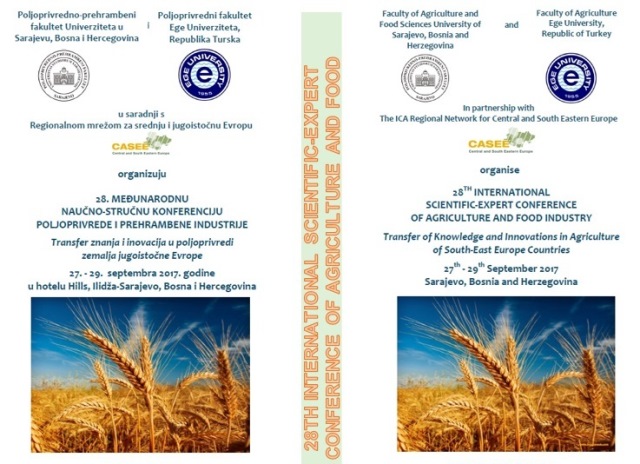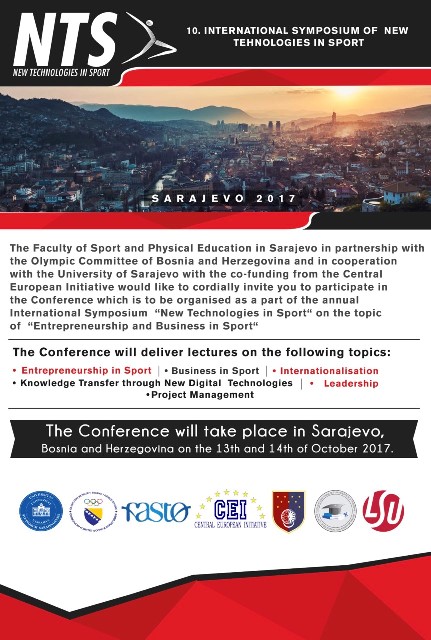|

Prva ihtiološka konferencija jugoistočne Evrope (SEEIC 2017)
Institut za genetičko inženjerstvo i biotehnologiju (INGEB) i
Prirodno-matematički fakultet (PMF), pod pokroviteljstvom Univerziteta u
Sarajevu, organiziraju Prvu ihtiološku konferenciju jugoistočne Evrope
(SEEIC 2017), koja će biti održana od 27. do 29. septembra 2017. godine u
hotelu „Hollywood“ u Sarajevu (Bosna i Hercegovina).
Otvaranje konferencije će biti upriličeno u srijedu 27. septembra 2017. godine sa početkom u 9:30 sati.
SEEIC odaje počast Prvom evropskom ihtiološkom kongresu održanom u
Sarajevu 1973. godine, a konferencija će biti posvećena životu i djelu
cijenjenog ihtiologa i stručnjaka prof. dr. Tonka Šoljana.
SEEIC 2017 pruža idealnu priliku za istraživače iz jugoistočne Evrope i
one koji su zainteresirani za ihtiofaunu date regije da se susretnu i
prezentiraju rezultate svojih istraživanja te razmijene ideje i
prijedloge. Znanstvenici, studenti, menadžeri, predstavnici nadležnih
vladinih institucija te drugi profesionalci iz oblasti ihtiologije i
akvakulture pozvani su da sudjeluju u ovom događaju.
Na konferenciji će biti predstavljene usmene i poster-prezentacije
koje se bave temama iz oblasti historije ihtiologije, taksonomije i
sistematike, biodiverziteta i konzervacije, molekularne biologije te
ribarstva i akvakulture. Naučni radovi s konferencije koji zadovolje
recenziju bit će objavljeni u posebnim izdanjima časopisa Acta Adriatica (marinski ekosistemi) i The Croatian Journal of Fisheries (slatkovodni ekosistemi).
Sve relevantne informacije u vezi s konferencijom moguće je pronaći na web stranici https://www.seeic.eu/.

28. međunarodna naučno-stručna konferencija poljoprivrede i prehrambene industrije
Poljoprivredno-prehrambeni fakultet Univerziteta u Sarajevu i
Poljoprivredni fakultet Univerziteta Ege (Turska), u saradnji sa
Regionalnom mrežom za srednju i jugoistočnu Evropu (CASEE), organiziraju
28. međunarodnu naučno-stručnu konferenciju poljoprivrede i prehrambene
industrije.
Konferencija će biti održana od 27. do 29. septembra 2017. godine u
hotelu „Hills“, Ilidža, Sarajevo, a otvaranje konferencije će biti
upriličeno 28. septembra 2017. godine sa početkom u 10:00 sati.
Tema plenarnih izlaganja na konferenciji je „Transfer znanja i
inovacija u poljoprivredi zemalja jugoistočne Evrope“, a uvodničari će
biti: prof. dr. Andrea Knierim (University of Hohenheim), mr. Donald
Aquilina i dr. Cosmin Salasan. Za učeće na konferenciji prijavljena su
134 rada iz oblasti poljoprivrede i prehrambene industrije iz deset
zemalja, a konferencija će raditi u četiri sekcije: biljna
poljoprivredna proizvodnja, animalna poljoprivredna proizvodnja,
prehrambene tehnologije i održivi razvoj agroindustrije i ruralnih
područja.
Sve pojedinosti su dostupne na web stranici www.ppf.unsa.ba.
PROGRAM KONFERENCIJE

Poziv na konferenciju „Poduzetništvo i biznis u sportu“
Međunarodni simpozij „Nove tehnologije u sportu“
Fakultet sporta i tjelesnog odgoja Univerziteta u Sarajevu u saradnji
sa Olimpijskim komitetom Bosne i Hercegovine, te uz podršku
Univerziteta u Sarajevu i uz sufinansiranje Centralne evropske
inicijative, sa velikim zadovoljstvom vas poziva da uzmete učešće na
konferenciji o temi „Poduzetništvo i biznis u sportu“, koja će se
održati 13. i 14. oktobra 2017. godine u Sarajevu u okviru međunarodnog
simpozija „Nove tehnologije u sportu 2017“.
Fakultet sporta i tjelesnog odgoja Univerziteta u Sarajevu već duži
niz godina organizira međunarodni simpozij „Nove tehnologije u sportu“
(NTS), koji tradicionalno okuplja eminentne stručnjake i predavače iz
Evrope, regije i Bosne i Hercegovine. Ove godine simpozij „Nove
tehnologije u sportu 2017“ je deseti u nizu te za organizatore
predstavlja veliku čast i izazov da se kao takav obilježi na poseban
način. S tim u vezi, organizatori su ove godine odlučili da pozovu i
studente iz Evrope i regije koji će zajedno sa našim studentima
učestvovati na simpoziju te doprinijeti proslavi desetog po redu
renomiranog međunarodnog simpozija.
Glavni cilj konferencije je promocija otvorenog obrazovanja o temi poduzetništva u sportu, a predavanja koja će biti održana u okviru konferencije obuhvatit će sljedeće teme:
• Poduzetništvo u sportu
• Biznis u sportu
• Internacionalizacija
• Prenos znanja kroz nove digitalne tehnologije
• Liderstvo
• Projektni menadžment
Sveukupni cilj konferencije je da podigne svijest o prednostima
poduzetništva u sportu, poveća stepen inovacije i modernizacije u
visokom obrazovanju, omogući najnovije informacije o poduzetništvu u
Evropskoj uniji i njegovoj primjeni u zemljama članicama Evropske unije i
onima koje to još nisu.
Call for Papers
Public and Applied History on the Battlefield of Europe. Dealing with Painful Pasts in the 20th Century
First conference of the Jean Monnet Network “Applied European Contemporary History”
History and representations of the past have become an increasingly
public issue, especially over the past decades. The prerogative of
interpretation no longer belongs exclusively to scholars and
institutions related to universities. The reasons for this vary. Civil
society, for instance, increasingly wishes to have a voice in
representing pasts that were experienced as painful (which e.g. holds
true for NGOs in post--‐war or post--‐dictatorship societies). Another
reason might be the effort to tell histories from below which so far
have been neglected by academic discourse, as with the history workshop
movement in Great Britain, Germany and other European countries. Yet a
completely different explanation point toward the nostalgic
appropriation of the past often found in local heritage and history
societies.
In this situation of change historical sciences are undergoing a
phase of adaptation in order to recognize the democratization of the
production of historical knowledge. Public and Applied History are
aiming at responding to this challenge. They provide an innovative
approach to historical sciences that deals with the intersections
between academic research and society’s methods of producing historical
knowledge. While Public History can be described as the broad and
overarching concept that deals with the uses of the past in public,
Applied History as its subordinate field explores more specifically how
historical knowledge is made; how interpretations of the past impact
society; why there is a societal need to deal with the past at all; and
finally, what effect these issues have on the scientific methods of
historical research.
In doing so Public and Applied History can provide an innovative
contribution to that highlights historical science’s European scope.
This approach is the underlying idea of the Jean Monnet Network “Applied
European Contemporary History.” As part of the broad field of Public
History, the network aims to how methods of dealing with the past can be
informed by a deeper understanding of the historical cultures of the
neighbouring European countries. Comprising members from Belgium, Bosnia
and Herzegovina, Germany, Poland, and Serbia, the network strives to
explain national cultures of history in their specific constructions and
further create relationships between them, thus making potential
conflicts both appreciated and understood. A central issue is how
societies come to terms with experiences of war and violence and of
guilt and victimhood in the 20th century.
At the same time the network aims to sharpen the methodology and
didactics of this approach through a transnational dialogue beyond its
participants. During our first conference, we would like to discuss the
network’s approach with interested scholars and practitioners from
European countries in order to map the European landscape of Public and
Applied History.
In a first step, we would like to explore the similarities and
differences between theoretical and analytical approaches to and
terminology of Public and Applied History (not always necessarily
labelled as such) and their uses in different national contexts
throughout Europe. Initially these discussions were stipulated by the
discourse concerning “memory” and “remembrance.” As the field has been
developing dynamically, the references and connections between the
memory discourse and Public and Applied History should be scrutinized in
this panel, too.
The papers in this section could address the following questions:
- When and why did “memory” become a crucial concept in the humanities in the respective countries?
- Which terms regarding Memory Studies and Public and Applied History
have been coined so far? To what theoretical concepts do these terms
refer?
- To what extent do transfer processes between countries and
scientific communities play a role when new terms are coined in the
field of Memory Studies / Public and Applied History?
- The debates in Memory Studies and Public and Applied History respond to what social needs?
- How do practitioners who work in sites of memory, museums,
education, and other realms outside universities view the debate on
Memory Studies and Public and Applied History?
In a second step, we would like to discuss case studies in Public
and Applied History from European countries that are concerned with
dealing with painful pasts in the 20th century. These case studies
should focus on national frameworks of Public or Applied History as well
as emphasize transnational constellations.
Questions addressed by these papers might be:
- To what extent does civil society claim to be an actor in the
production, representation and implementation of historical knowledge?
To what need(s) do civil society actors respond, and what aims do they
follow when engaging in public history or memory work?
- To what theoretical concepts do these initiatives refer? To what extent do transnational networks play a role?
- How far do initiatives from below contribute to a democratization of the production of historical knowledge?
- How are negotiations shaped by public history actors and
representatives of official politics of remembrance in cases of
contested pasts? How do initiatives from below interfere with politics
of history education?
- What alternative histories do these initiatives try to tell? What
narratives do they shape? And concerning painful pasts: Where are limits
of understanding the Other?
The conference will take place at Friedrich Schiller University,
Jena, Germany, from November 7th to November 9th. Accommodation and
travelling costs will be arranged and covered. The conference will take
place in English.
If interested, please send an abstract (no longer than 300 words) and a short CV by July 15th, 2017 to Dennis Dierks (
Ova email adresa je zaštićena od spam robota, nije vidljiva ako ste isključili Javascript
) and Juliane Tomann (
Ova email adresa je zaštićena od spam robota, nije vidljiva ako ste isključili Javascript
).
6th biennial international conference
"INFuture2017: Integrating ICT in Society"
http://infoz.ffzg.hr/INFuture/
8-10 November 2017
The Westin Zagreb Hotel, Zagreb, Croatia
organised by
Department of Information and Communication Sciences
Faculty of Humanities and Social Sciences
University of Zagreb, Croatia
Conference topics:
1. Governmental and Business Sector Informatics (G&B)
2. e-Health Applications and Solutions (e-H)
3. Human-Computer Interaction and Language Technologies (HCI<)
4. Digitisation, Records Management and Digital Preservation (D-RM-DP)
5. Personal Digital Information Management (PDIM)
6. e-Science (eSCI)
7. Her.IT.age (HIT)
8. Community Informatics (CI)
9. Integration of ICT in Education (ICT-E)
10. e-Encyclopaedia (e-E) - topic organised in association with The Miroslav Krleža Institute of Lexicography
The European Association for Banking and Financial History’s (eabh) Workshop will be held during the INFuture2017 conference.
We invite you to submit your paper in one of several paper
categories. Details about the conference topics and paper categories can
be found at:
http://infoz.ffzg.hr/INFuture/conference/conference-topics
Papers undergo international double blind peer review, and will be published for the conference. INFuture publications are indexed by EBSCO. Other relevant databases are being considered.
Submission deadline is 1 May 2017.
Call for papers can be downloaded in PDF from:
http://infoz.ffzg.hr/infuture/images/INFuture2017-CfP%20v1.pdf
The European Association for Banking and Financial History’s (eabh) Workshop will be held on Friday 10 November 2017.
Organisational team is ready to answer all your questions!
Contact us at
Ova email adresa je zaštićena od spam robota, nije vidljiva ako ste isključili Javascript
|
